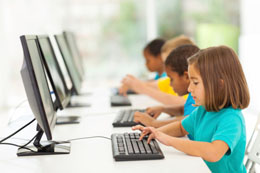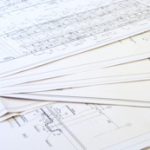To know more about the different types of technology in the classroom, that are slowly becoming popular with the education system today, read the following article.

Whenever we think of a classroom, all we can imagine is a teacher and students, where a teacher is lecturing students and students are taking down the notes. It comes to our mind naturally, because we all studied in that manner. But the scenario has changed today as many schools are incorporating technology in the classroom that is making the learning process more effective and more entertaining. The different types of technology in the classroom make education and learning a fun experience for children.
Technology Used in Classrooms
Given below are some of the most basic types of technology to use in the classroom that would help you understand their importance.
Whiteboard
We will name it ‘magic board’. Does the name sounds interesting? Imagine how thrilled children would feel when they hear this name than the usual, boring blackboard. Whiteboard makes education an interactive process. It is an easy to use device that is used in combination with computer and a projector. Your board can be quickly transformed into a computer screen, which can be viewed by all the children in the classroom. Movable objects, sounds, and pictures can make the lessons as well as teaching interesting and easy to understand.
SMART Boards
They are a fantastic way to keep the mind of a student alert in class. It is an interactive whiteboard, which allows the professor to project an image from a laptop to the front of the room. Then, the teacher can digitally draw on that image. Graphs and tables are also available with this. It can also enhance plain templates into customized learning tools, as well as store plenty of information.
Mimio Boards
They are interactive white boards that allow the teacher to use computer functions on the whiteboard. Sensors are placed in this board, and a special pen is to be used, that acts like a mouse. Teachers go through the graphs, figures, lessons, websites, etc., using this board. Students can also use this to display their PowerPoint presentations.
Projector
A projector is again one of those devices that has wide applications in the classroom. A teacher can present a lesson using meaningful and colorful transparencies that grabs the attention of the students immediately. A teacher can also present notes in the similar manner, where a student can read everything from the last bench as well. Apart from this, using a projector with computer has more benefits. You can show students many documentaries, short study films, or PowerPoint presentations that contribute to increased retention. This is used in psychology, biology, chemistry, engineering, and many more such streams.
Sound Amplifiers
Sound amplifiers are very useful and are widely used in big classrooms. At times, many students cannot grasp what the teachers are saying, because they cannot hear them. At such times, sound amplifiers are useful as they make the teacher audible to all the students. Many research studies have concluded that a clear and audible voice can grab the attention of the students that results in better learning. After realizing the importance of such devices in schools, many schools also use mike system where a student can ask the question sitting on his own desk without having to shout. Also, teachers and students use wireless microphones, which help people with mild voices to present their doubts and queries clearly to the entire class. Research has proved that microphones help students and teachers interact in a better manner, reduce student absenteeism, and help to promote a clear, discussion oriented class, which goes ahead to boost the students’ confidence.
Personal Computers
Imagine, students have to carry no books to schools, just wear the uniform and take the lunch box, and they are ready for school! Well, it is possible now with the inbuilt individual personal computers that many schools provide their students with. Students can access books, notes, dictionaries, encyclopedias, etc., on their PCs with the help of the Internet and special educational software that are extremely user-friendly and promote better learning process. Some educational software are fun to use, as they teach children through games, pictures, charts, and graphs. Such things hook the interest of a student for longer time and make even the boring subject an exciting one. There are also software available on custom platforms, which include book-like devices (for ebooks), consoles, Leapfrog products, etc.
Internet
The internet is a treasure trove of knowledge. In the 21st century, it is impossible to imagine our lives without the web. It has proved to be tremendously useful in schools and colleges as well. With the help of the internet, the school/college website can be created, using which the student can come to know each and everything that is happening in class, and he can stay updated wherever he is. For instance, if the student is ill or has not attended school due to some reason, and the teacher has announced a new test and has uploaded the date on the website, he can get to know about it just by browsing through the site. Also, the teacher can conduct online tutorials and mock tests. Students can also submit their seminar notes, projects, and homework. Also, there are a lot of ebooks available, through which students can gather information and increase their knowledge. Important sites like Google Earth and Google docs can also be used. A multitude of educational sites are available for students, some prime examples being Quora, Discovery Education, Interactive Learning Sites for Education, etc.
Software
The advent of IT has revolutionized the outlook of the world. Each and every application in every field has particular software to work with. There are plenty of such educational software as well. They are used by teachers for the grading system, to grade the students according to their work and merit. In huge institutions, a variety of software is used to collect student data, related to their personal information, academic progress, extra-curricular activities, etc. It is used in classrooms as well, to have an e-format, which helps teachers with student assessment. Some examples of such software include Microsoft, GradeXpert, Accelerus, Rediker, etc.
These were some of the types of technology in the classroom that are easy to use. These technologies are beneficial, as students can use them for learning, practicing, and expanding what they have learned. They allow students to access course material or a syllabus easily. They also encourages the participation of each student in the learning process, which is crucial for better understanding of the subject. They also help teachers in better classroom management. Today, when children are so tech savvy and love spending time with gadgets, they can provide them with stimulus, making learning or studying a fun activity.











RSS